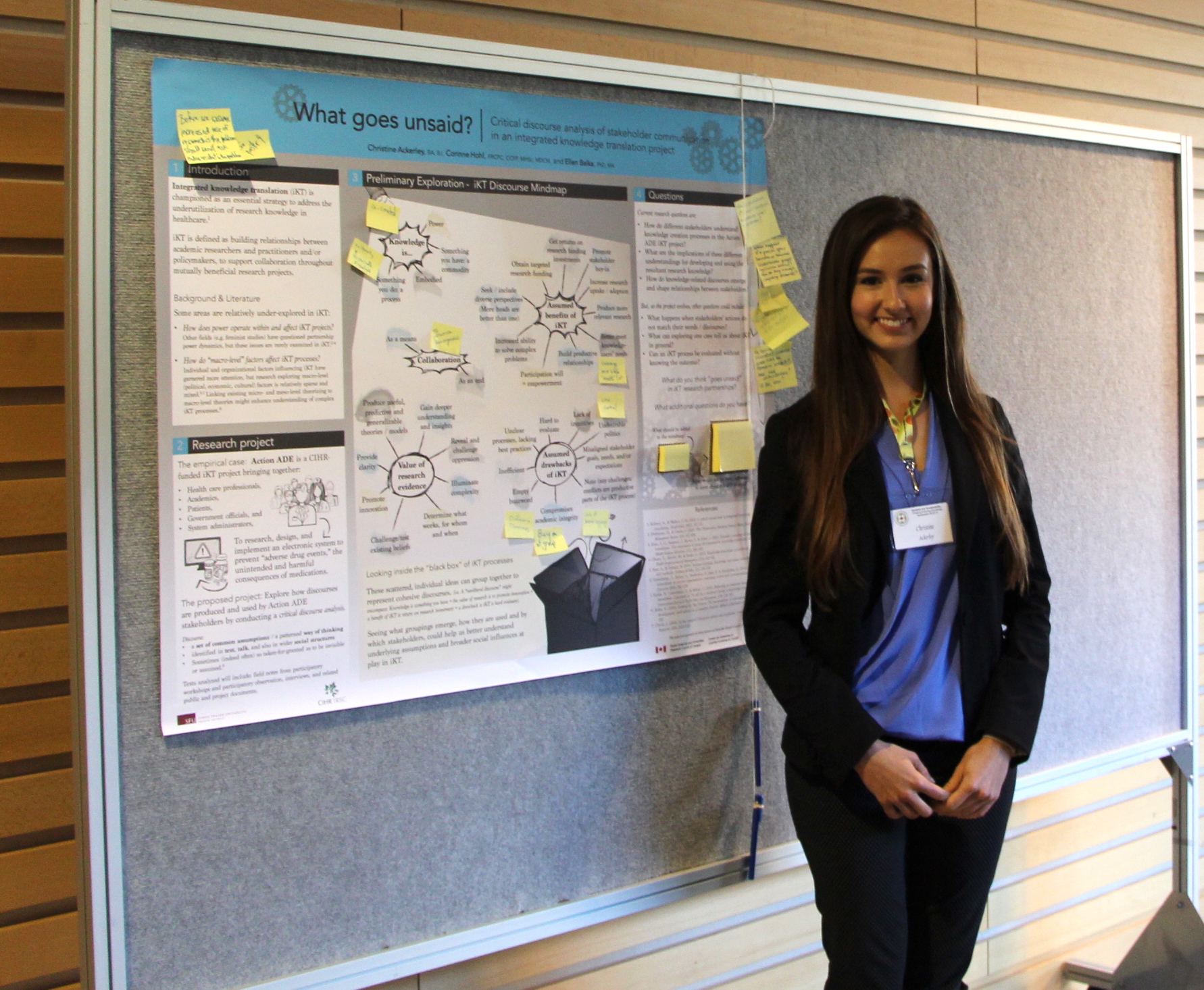by Amy Richardson, CFICE Communications RA
What started as a part time job during university, turned into a passion.
Christine Ackerley worked with the Community First: Impacts of Community Engagement (CFICE) project during her undergraduate degree in Journalism at Carleton University. From September 2014 to May 2015, Ackerley assisted the Knowledge Mobilization Hub by writing blog posts, managing social media and helping with C2UExpo 2015.

Christine Ackerley, former CFICE Knowledge Mobilization Research Assistant.
Since then, Ackerley has graduated and moved to Vancouver, British Columbia where she is pursuing her Masters in Communication at Simon Fraser University. Currently, she is working as a research assistant for her graduate supervisor on a project, called Action ADE, to help mobilize knowledge in the healthcare field.
Action ADE’s goal is to prevent adverse drug events, or ADEs, from happening. An adverse drug event is a harmful or unintended consequence caused by taking a drug.
“It’s really interesting because it’s all about communicating information to save lives,” Ackerley says.
Action ADE is creating an electronic platform that would mobilize patient knowledge between healthcare providers.
Ackerley says working on a project like this is very valuable.
“It’s just so important because the research that this one team has done can have an enormous impact across Canada with a relatively simple change – just implementing a small, easy electronic tool that has all this potential to save lives,” she says.
Currently in British Columbia, there is no system to translate knowledge of adverse drug events, meaning it’s common for a patient to have the same reaction to a drug multiple times because there is no warning to healthcare providers.
That’s why this work in knowledge mobilization is so important to Ackerley.
However, Ackerley didn’t know she’d end up mobilizing knowledge as a career path.
“I think I was interested in knowledge mobilization without really realizing it in journalism because I loved writing stories about complex ideas or research that was being done,” she says.
“I always loved that each project could be on a completely new topic that was totally foreign to me. I loved that learning curve of having to do a lot of research.”
It wasn’t until her undergraduate thesis supervisor recommended she explore the area of knowledge mobilization that she found her calling.
“The more I read about it, the more I just loved it. I loved the aims of sharing research with people that could find it useful, and then it kind of snowballed from there,” she recalls.

Christine Ackerley presenting a poster on her current research project at the Canadian Knowledge Mobilization Forum.
While completing her undergraduate thesis on knowledge mobilization, she volunteered with CFICE. Soon after, Ackerley was welcomed on board as the CFICE Knowledge Mobilization Research Assistant where she was involved with C2UExpo.
“It totally shifted my interest and career path towards knowledge mobilization and I definitely see myself sticking with it,” she says.
“CFICE really helped me further develop my interest in knowledge mobilization and also give me a really complete and realistic picture of both the potential benefits and very many frustrations of knowledge mobilization, which I think is incredibly valuable,” she says, adding that getting hands-on experience better prepared her for the work she’s doing now.
In addition to the research project and school, Ackerley sits on the Leadership Committee of the British Columbia Knowledge Translation Community of Practice (BCKTCOP). She volunteers with them to help run the website, host webinars and write newsletters.
While she’s still in the early stages of her master’s thesis, she will be looking at how parties in a knowledge mobilization partnership understand and talk about a project in terms of goals, aims, and translating knowledge.
She is in her first year of a two-year graduate program at SFU.
Watch a video starring Christine Ackerley talking about plain language writing during her time at CFICE here.